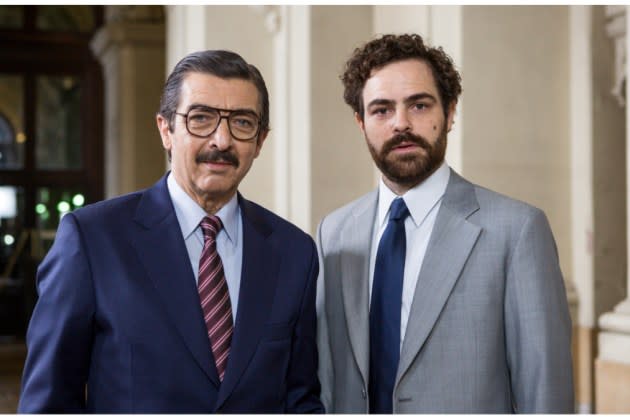‘Argentina 1985’ Sheds Light on the Momentous Trial of Argentina’s Military Junta
- Oops!Something went wrong.Please try again later.
- Oops!Something went wrong.Please try again later.

For Argentina’s Santiago Mitre, his courtroom drama “Argentina 1985,” a Golden Lion contender at the 79th Venice Film Festival, is an examination of the machinations of power from within, as were his past four features. But unlike those films, “Argentina 1985” is based on a real event, the trial of Argentina’s military leaders who ruled with brutal impunity until democracy was finally restored in 1983.
The civil trial is considered one of the most significant in modern world history, along with the Nuremberg trials when defeated Nazi leaders were put on the stand. The difference in this David vs. Goliath story is that Argentina’s military junta still had a grip on power when they were taken to court for their crimes.
More from Variety
Structured like a thriller but with some touches of wry humor, “Argentina 1985” is based on the story of lead prosecutors Julio Strassera and Luis Moreno Ocampo, and their young legal team as they raced against time to gather enough evidence and witnesses before the trial date, fending off death threats before and during the trial. Car bombs were set off in the military’s attempts to intimidate them.
The co-production between Amazon Studios, Mitre’s La Unión de los Ríos, Kenya Films and Infinity Hill will also play in the San Sebastian and Zurich festival. It will be released theatrically and on Prime Video in the fall.
“For me and my fellow Argentines, this had always been an important and exciting event,” says Mitre, who was surprised to discover that the trial had never been brought to either big or small screens in Argentina.
“It started as a conversation between us some four years ago. We had been asking ourselves what in Argentina’s history had not been told yet,” says lead producer Axel Kuschevatzky of Infinity Hill, who has known Mitre since he produced the director’s debut feature, “Paulina.”
Stars Ricardo Darin (“The Secret in Their Eyes,” “Wild Tales”) and Peter Lanzani (“The Clan”) boarded the project even before there was a script. Darin, who starred in Mitre’s “The Summit,” also came on as a producer with his company, Kenya Films.
Working with his regular writing partner Mariano Llinás, Mitre dove deep into research, interviewing witnesses, trial participants, digging into archives and visiting some sites, a two-year process. “We wanted a meticulous and truthful reconstruction of the events, although we took creative license with some details,” he recalls. As luck would have it, they were able to film in the actual courtroom, which had remained intact. “We felt like we had traveled back in time,” he muses, detailing how he worked closely with art director Micaela Saiegh and cinematographer Javier Julia to re-create that era.
While they took some creative liberties and some characters were composites of various people, the testaments at the trial are recited verbatim by the actors, he points out. “Trial scenes can be methodical and dry so it was a challenge to make it a courtroom thriller with elements of tension and intense emotion,” he says. “It was a great learning experience, I think Argentines and the rest of the world will learn of many little-known details,” he adds.
“One of the reasons why we made this film is because most of us have young children; we made this for the generations to come and most of all, to demonstrate how fragile democracy is,” Kuschevatzky points out, adding: “While there will always be doubts that justice can prevail in a democracy; this trial proves it can be done. The message is universal and can be applied to the current state of the world we live in: ‘Nobody is above the law.’”
Best of Variety
Sign up for Variety’s Newsletter. For the latest news, follow us on Facebook, Twitter, and Instagram.
